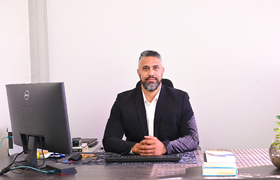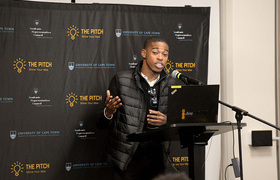Bridging campus business gap with innovative marketplace
12 November 2025 | Story Myolisi Gophe. Photo Lerato Maduna. Read time 6 min.
University of Cape Town (UCT) final-year mechatronics student and entrepreneur Mpilonhle Ngcoya is proving that innovation often begins with solving problems close to home. As the founder of Makethe, a digital marketplace designed to connect UCT students with student-run businesses, Ngcoya is on a mission to reshape how entrepreneurship thrives within campus spaces.
“It started as a simple idea: to help student businesses grow,” he said. “Many students have great products or services but struggle to get the word out. We wanted to bridge that marketing gap.”
Makethe, which officially launched in 2022, aims to give student entrepreneurs visibility and easier access to customers. The platform allows users to discover and book services or purchase products from peers – from hairstylists and photographers to small clothing brands and food sellers.
“Our goal was to create a platform that makes student-to-student trade easier, faster, and more transparent.”
Ngcoya, who hails from KwaZulu-Natal, said the inspiration for Makethe came from watching fellow students struggle to expand their businesses despite the high demand for affordable, peer-based services. “Some students would have amazing businesses but couldn’t reach enough people,” he said. “Our goal was to create a platform that makes student-to-student trade easier, faster, and more transparent.”
Initially, Ngcoya ran the business alone, balancing development work with his demanding engineering coursework. “I started on 15 November 2022, and for the whole of 2023, I worked by myself,” he recalled. “It was really difficult trying to run everything alone, but that experience showed me where my strengths and weaknesses were.”
By March 2024, Makethe was officially registered as a company, and Ngcoya began building a team of fellow UCT students to help scale the project. Today, the small team of three, which includes Jonathan Tirkaso and Kwanele Ndzimande, continues to refine the platform and grow its user base.
Filling a gap in student commerce
One of Makethe’s early breakthroughs came through partnerships with student councils. Many councils at UCT face lengthy delays when processing funds through official university systems – sometimes waiting up to three weeks for reimbursements. In contrast, Makethe’s payment system allows transactions to be completed within 48 hours.
“That was a huge difference for them,” said Ngcoya. “We also built features that help student councils keep track of who ordered what, which made managing their sales and merchandise much easier.”
“I’ve sacrificed a lot of my academic time for the business, and I’ve paid the price in my studies. But I believe in what we’re building.”
Currently, Makethe hosts three active student businesses on its platform, with plans to onboard many more. “Our vision is to make Makethe the go-to place for students when they need something,” he said. “Whether you’re looking for a haircut, a nail technician, or a photographer, you should be able to find it easily through Makethe.”
Ngcoya pointed out how fragmented student commerce currently is. “At Forest Hill Residence, there are over 800 students, but only 196 are in the marketplace WhatsApp group where businesses advertise,” he said. “That shows how many students aren’t being reached. Makethe is here to fix that.”
Recognised innovation
Ngcoya’s work has already earned recognition beyond UCT. His team represented the university in the Enactus South Africa National Pitch Competition a few months ago, an initiative that empowers student entrepreneurs tackling socioeconomic challenges through innovative business models.
“It was UCT’s first time making it to the finals,” Ngcoya said proudly. “In the semifinals, we came first in the MTN Digital Innovation category and second in Harmony’s Business Solution category. In the national finals, we placed third overall.”
While only the top team advances to the Enactus World Cup, Ngcoya views the experience as vital validation. “It was confirmation that our solution works,” he said. “To be recognised for something we’ve been building for two years – it’s an incredible feeling.”
The prize money from the competition has gone toward sustaining the business, including covering hosting fees and operational costs that previously came out of the founders’ pockets.
The sacrifice and the vision
Running a startup while completing an engineering degree has been far from easy. “You have to be a little insane to keep working toward something without seeing immediate results,” Ngcoya laughed. “I’ve sacrificed a lot of my academic time for the business, and I’ve paid the price in my studies. But I believe in what we’re building.”
Ngcoya’s goal is to establish Makethe as the default digital marketplace across not only UCT but the higher education sector in South Africa. “When people think of buying something on campus or finding a service, I want them to think of Makethe, just like how people think of Takealot for online shopping,” he said. “I want Makethe to reach all 26 public universities in South Africa,” he said. “Eventually, we’d love to enable cross-campus trading, where a student in Johannesburg could buy something from a seller in Cape Town.”
“We’re bringing opportunity closer to everyone.”
To fellow students dreaming of starting a business, Ngcoya offers both encouragement and caution. “If you want to take entrepreneurship seriously, start small and start early, but be aware of the risks,” he advised. “If you’re doing it just for extra income, that’s fine. But if you want to make it your life’s work, manage your time wisely. Don’t let your studies suffer the way mine did.”
Despite the challenges, Ngcoya remains steadfast. “I still want to come back for my master’s in engineering,” he said. “But for now, I’m focused on making Makethe a success.”
As for the company’s slogan – “Bringing the world to you” – Ngcoya said it reflects both sides of the platform. “For customers, it means access to what they need; for businesses, it means access to customers,” he explained. “We’re bringing opportunity closer to everyone.”
 This work is licensed under a Creative Commons Attribution-NoDerivatives 4.0 International License.
This work is licensed under a Creative Commons Attribution-NoDerivatives 4.0 International License.
Please view the republishing articles page for more information.










